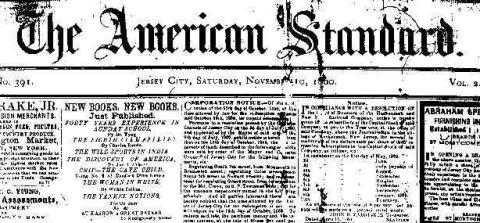How did Northerners and Southerners View African-Americans?

American Standard, November 10, 1860 Jersey City, NJ
What shall we do with the Negro?
"It is useless to deny either the importance or intrinsic difficulties of the slavery question...Not the smallest of the difficulties which beset this hard question are the capability of the Negro race for freedom... whether in our own Nation or in an independent one of his own; and what to do with such of them as are slaves on the supposition that a general system of emancipation is ever resorted to."
"The warmest friends of the Negro race...are in doubt upon these points. Few thoughtful men can for a moment be brought to entertain the idea that if the Negro is emancipated, he either can or ought to remain in the South in the same society with the masters from whom he might have just then been freed.
"The Negro is incapable of a high degree of well being if left to himself...his reproductiveness, and by consequence his well being, is at the greatest when he is under the guidance and government of a more intellectual and abler race than his own."
The South
Louisiana Picayune, January 1, 1863
Appeal from nearly one hundred ministers of all denominations in the Confederate states, seeking to enlist English sympathy in the Confederate cause:
"The moral and religious interests of the South ought to be appreciated by all nations. These interests have realized certainly no benefit from the war. We are aware that in respect to the moral aspects of the question of slavery we differ from those who conceive of emancipation as a measure of benevolence, and on that account we suffer much reproach which we are conscious of not deserving.
"We are familiar with their physical and moral condition, and alive to all their interests; and we testify in the sight of God, that the relation of master and slave among us, however we may deplore abuses in this, as in other relations of mankind, is not incompatible with our holy Christianity, and that the presence of Africans in our land is an occasion of gratitude on their behalf before God."
"The South has done more than any people on earth for the Christianization of the African race. The condition of slaves here is not wretched, as Northern fictions would have men believe, but prosperous and happy, and would have been yet more so but for the mistaken zeal of the abolitionists. Can emancipation obtain for them a better portion?..We regard abolitionism as an interference with the plans of Divine Providence."
Questions
Read the following accounts from New Jersey and Louisiana newspapers and answer the following questions.
- What concerns did the Northern author express about freed African-Americans?
- Would you classify the Northern article as racist? Why or why not? Use supporting details.
- Why did the Southern author assert that Africans should be grateful to be in the United States?
- Why did the author claim that slave conditions would be even better 'but for the mistaken zeal of the abolitionists'?
- Why would Southerners claim to regard abolitionism as an interference with the plans of Divine Providence'?
- Choose either the American Standard or the Louisiana Picayune article. Then respond to the article by writing your own editorial. Be sure to address the arguments/reasoning brought up in the article. Also, your editorial should be written from the perspective of someone from the 1860s